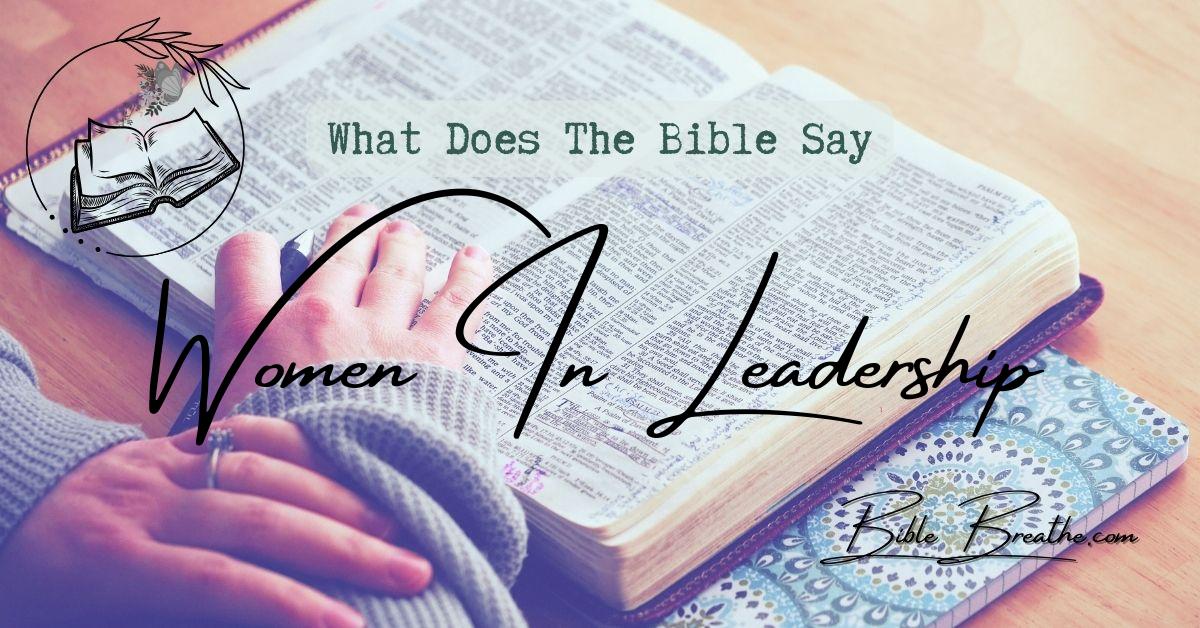What does the Bible say about women in leadership?
Well, folks, let’s dive into this deep well of knowledge and uncover the truth.
Picture the Bible as a treasure map, and these incredible women are the jewels we seek.
The Good Book introduces us to powerful women like Deborah and Esther, who rocked the boat in their time.
But wait, there’s more!
We’ll talk about the apostle Paul’s thoughts on women, and that’s a real talking point.
Join me as we flip through the Old and New Testaments, meeting female prophets, leaders, and disciples.
From Miriam to Lydia, these ladies were true trailblazers.
We’ll discuss what it all means and how these women fit into the divine plan.
As we navigate this journey, remember, it’s not just history; it’s a living discussion for today.
Let’s get ready to explore and understand the Bible’s take on women in leadership.
It’s a fascinating ride, my friends!
🌟
Key Takeaways
- The Bible presents numerous instances of women in leadership roles, challenging traditional gender norms in their respective historical contexts.
- It is crucial to recognize and value the significant contributions made by women in both the Old and New Testaments, such as Deborah, Esther, and Phoebe, who played pivotal roles in their communities.
- Modern churches are called upon to embrace and actively support women in leadership positions, fostering inclusivity and equality in religious leadership roles.
- Understanding the historical and cultural contexts of biblical passages related to women in leadership is essential for interpreting and applying these teachings today.
- Embracing the empowerment of women in leadership is not only a matter of biblical interpretation but also a reflection of evolving societal values and the pursuit of greater gender equality within faith communities.
Exploring Women’s Leadership in the Bible

Photo modified by BibleBreathe.com. Original photo by Tim Mossholder on Unsplash
Let’s journey into the heart of the matter—women in leadership, a subject richly woven throughout the Bible.
The scriptures unveil stories of remarkable women who held influential roles, displaying wisdom, strength, and faith.
Deborah: A Judge and Prophetess
In the book of Judges (chapters 4 and 5), we meet Deborah, a beacon of wisdom and guidance during tumultuous times.
Deborah served not just as a judge but also as a prophetess.
“And Deborah, a prophetess, the wife of Lapidoth, she judged Israel at that time.” – Judges 4:4 (KJV)
Deborah’s story illustrates that women can hold pivotal roles in governance and offer divine counsel.
Her leadership extended beyond the battlefield as she provided judgments and guidance to her people.
Miriam: A Leader in the Exodus
In Exodus 15:20, we learn about Miriam’s role during the Exodus, standing alongside Moses and Aaron.
Miriam’s leadership was marked by her support and her pivotal part in the celebration of their deliverance.
“And Miriam the prophetess, the sister of Aaron, took a timbrel in her hand; and all the women went out after her with timbrels and with dances.” – Exodus 15:20 (KJV)
Miriam’s role wasn’t just one of passive observation; she actively led the women of Israel in celebration, showcasing her leadership and influence.
Huldah: A Prophetess of Restoration
In 2 Kings 22, we uncover the story of Huldah the prophetess, who played a significant role in the restoration of the kingdom.
Her insights and wisdom were sought after during a time of great need.
Huldah’s leadership encompassed spiritual and political aspects.
Her authority in interpreting the Word of God and advising King Josiah exemplify the profound impact women can have in shaping the destiny of nations.
Esther: Courageous Leadership
The Book of Esther introduces us to a fearless leader, Esther herself.
Her courageous actions to save the Jewish people exemplify that women can rise to the occasion in the most challenging circumstances.
Esther’s leadership was born out of necessity and driven by her deep faith.
She didn’t let fear hold her back, showcasing the power of female leadership in times of crisis.
These examples paint a vibrant picture of women in leadership roles within the Bible.
They remind us that leadership is defined by faith, wisdom, and courage, not by gender.
The Bible offers a mosaic of leaders, both male and female, inspiring us to lead with purpose and conviction.
So, when pondering the role of women in leadership, remember these stories of strength, wisdom, and faith that the Bible offers, echoing the words of Proverbs 31:25:
“Strength and honour are her clothing; and she shall rejoice in time to come.” – Proverbs 31:25 (KJV)
These stories are not only a source of inspiration but also a testament to the fact that women have been integral to leadership throughout biblical history.
Their contributions have shaped the course of events and continue to inspire leaders of all genders today.
The Bible offers a diverse tapestry of leadership, where women stand as pillars of strength, wisdom, and faith.
🌟
Women Leading the Way: Insights from the Good Book

Photo modified by BibleBreathe.com. Original photo by Cam on Unsplash
Hey, let’s dig into this hot topic about the role of women in leadership, unearthing some hidden gems from the New Testament.
It’s like discovering buried treasure, stories that deserve to be admired.
Mary of Bethany: A True Disciple
Talking about women in leadership, we gotta highlight Mary of Bethany.
In Luke 8:1-3, we witness Mary not just tagging along with Jesus but fully engrossed, soaking up every word from the Master.
It’s like she got a front-row seat in the school of faith.
Her hunger for spiritual knowledge set her apart, challenging the norms of her time.
Picture her, this eager student, absorbing every bit of wisdom that flowed from Jesus’ lips.
“But Mary sat at the Lord’s feet, and heard his word.” – Luke 10:39 (KJV)
Mary Magdalene: Witness to a Miracle
Another Mary, Mary Magdalene, played a pivotal role in a history-altering moment—the resurrection of Jesus Christ.
In John 20:14, we find her at the empty tomb, heart pounding with a mix of fear, confusion, and awe.
She was the first witness to this glorious event, a foundation of the Christian faith.
Later, she fearlessly shared the Good News.
Her story shouts loud and clear that leadership doesn’t play favorites with gender.
“Jesus saith unto her, Woman, why weepest thou? whom seekest thou?” – John 20:14 (KJV)
Lydia: A Hospitable Leader
In Acts 16:14-15, we meet Lydia, a purple cloth seller, whose heart opened up to the message of Christ through Paul.
What’s remarkable about Lydia is her leadership not only in her faith journey but also in her hospitality.
She invited Paul and his crew into her home, showing us that leadership often means creating a welcoming space for others to grow in their faith.
“And when she was baptized, and her household, she besought us, saying, If ye have judged me to be faithful to the Lord, come into my house, and abide there. And she constrained us.” – Acts 16:15 (KJV)
Phoebe: A Dedicated Deacon
In Romans 16:1, we meet Phoebe, described as a servant of the church.
The term used here, “servant,” is often translated as “deacon.” Phoebe had the significant duty of delivering Paul’s letter to the Romans.
This action showcases not just her leadership but also the trust placed in her by the apostle himself.
She was a woman of action, fulfilling her divine duty with grace.
Priscilla: Teaching and Partnering in Ministry
Acts 18:26 brings us Priscilla, who, alongside her husband Aquila, played a vital role in the early church.
They weren’t just a couple but a ministry powerhouse.
Priscilla is even mentioned first sometimes, emphasizing her active role in teaching Apollos.
This dynamic duo shows us that leadership can be a team effort, with both genders bringing their unique gifts to advance the Kingdom.
As we unpack these stories of women in leadership from the New Testament, we see a beautiful tapestry of diverse talents, gifts, and callings.
These women weren’t held back by the norms of their time; their faith empowered them, making them shining lights in a world that needed it.
Their stories keep inspiring us, affirming that leadership isn’t about gender but about devoted hearts and a call to faith.
The Prophetic Voice of Women in the Bible

Photo modified by BibleBreathe.com. Original photo by Jen Theodore on Unsplash
In the rich tapestry of the Bible, the role of women in leadership goes beyond earthly authority; it extends into the realm of prophecy.
Let’s explore the prophetic role of women and the profound impact they’ve had on shaping God’s message to humanity.
Joel’s Prophecy: Sons and Daughters Prophesying
The book of Joel, in chapter 2, unveils a remarkable prophecy:
And it shall come to pass afterward, that I will pour out my spirit upon all flesh; and your sons and your daughters shall prophesy, your old men shall dream dreams, your young men shall see visions.” – Joel 2:28 (KJV)
This prophecy is a divine declaration of the equality of spiritual gifts between men and women.
It foretells a time when women would rise as prophets alongside men, sharing God’s word and wisdom.
This prophecy found its fulfillment on the Day of Pentecost when the Holy Spirit descended upon the disciples.
On that day, both men and women received the gift of prophecy, fulfilling Joel’s words.
This event marked the beginning of a new era where women were not only allowed but also empowered to declare God’s message to the world.
The Ongoing Role of Women as Prophets
The Bible doesn’t confine the role of women as prophets to a single event.
Instead, it highlights the ongoing significance of women in prophetic leadership.
Throughout both the Old and New Testaments, we encounter women who carried the divine message.
Consider the prophetess Anna, mentioned in Luke 2:36-38, who recognized the infant Jesus as the Messiah and proclaimed His significance to those awaiting redemption in Jerusalem.
Her prophetic insight was instrumental in acknowledging Jesus’ identity.
“And there was one Anna, a prophetess… She coming in that instant gave thanks likewise unto the Lord, and spake of him to all them that looked for redemption in Jerusalem.” – Luke 2:36-38 (KJV)
Moreover, in Acts 21:8-9, we find Philip the evangelist’s four daughters, recognized as prophetesses.
Their role in the early Christian community reflects the ongoing importance of women as bearers of God’s word.
“And the same man had four daughters, virgins, which did prophesy.” – Acts 21:9 (KJV)
These examples underscore the biblical perspective that women have the right and calling to declare God’s Word and share in the prophetic ministry.
In the broader context of women in leadership, it’s clear that the Bible not only acknowledges but also celebrates women as prophets.
Their spiritual insights, wisdom, and God-given abilities have played an integral role in conveying divine messages and shaping the course of faith.
As we reflect on the prophetic role of women, we find inspiration in their unwavering commitment to delivering God’s message and leading in the spiritual realm.
Their legacy endures as a testament to the enduring truth of Galatians 3:28:
“There is neither Jew nor Greek, there is neither bond nor free, there is neither male nor female: for ye are all one in Christ Jesus.” – Galatians 3:28 (KJV)
In the eyes of God, gender is not a barrier to leadership or prophecy; it’s the heart’s willingness to be a vessel of His divine message.
🌟
Frequently Asked Questions (FAQs) About What Does The Bible Say About Women In Leadership
Were there any female leaders in the Old Testament?
Yes, the Old Testament includes accounts of female leaders like Deborah, who served as a judge and prophetess, and Esther, who became a queen and played a vital role in preserving her people.
These women demonstrated leadership and faith in their respective stories.
How did Jesus view women in leadership roles?
Jesus valued and supported women in leadership roles, as seen in his interactions with Mary Magdalene and other female disciples.
He promoted equality and recognized their contributions.
What did Paul say about women teaching in the church?
Paul advocated for women’s roles in ministry but expressed specific instructions in 1 Timothy 2:12, suggesting women should not teach or have authority over men.
Interpretations vary, but it’s crucial to consider the cultural context and overall biblical teachings that affirm women’s significant roles in the church.
Are there any examples of female apostles in the New Testament?
While the term ‘apostle’ is not explicitly applied to women in the New Testament, women played crucial roles in early Christian communities.
Phoebe, Junia, and Priscilla are examples of women actively involved in spreading the Gospel and supporting the early Church.
Their contributions highlight the inclusive nature of Christian ministry and the vital role women played in its development.
Matt Turner
I’m Matt, and I love breaking down Bible verses in a way that’s easy to understand and apply to everyday life. My goal is to help you connect with God’s Word and find practical ways to live it out. Whether you’re new to the Bible or just looking for some fresh insights, I’m here to walk with you and share what I’ve learned along the way.

